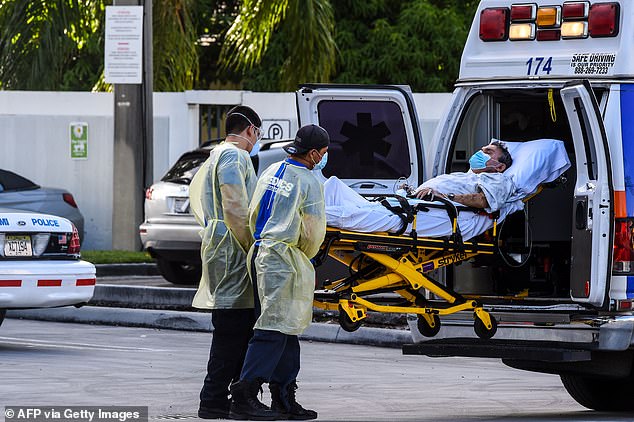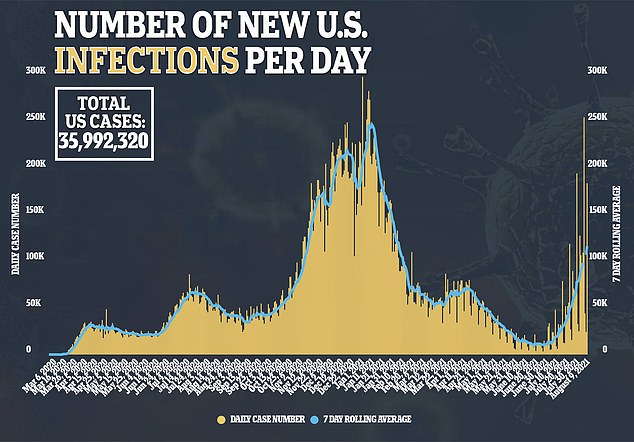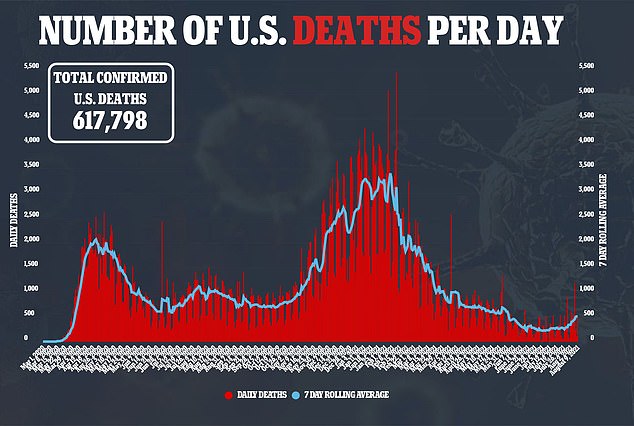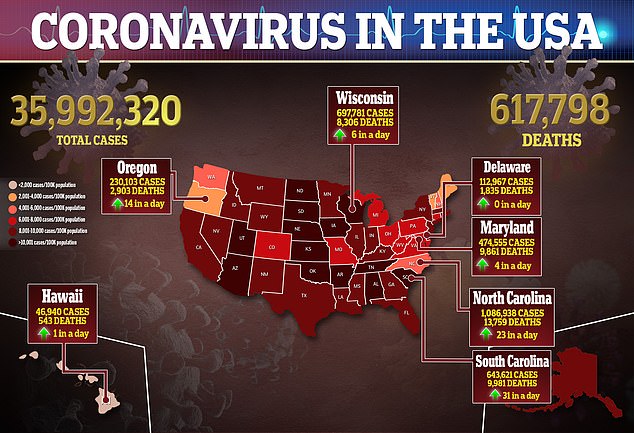Ambulances are being forced to wait outside of Florida hospitals until beds free up so COVID-19 patients can be admitted for treatment.
Some patients have had to wait up to an hour inside an emergency services vehicle until they can be transferred into a facility.
The wait is due to hospitals operating at near-max capacity in the state after rates of hospitalization have tripled in recent weeks.
While the ambulances are waiting to unload a patient, they are essentially off the grid, meaning they are unable to take another call and help other patients in need.
COVID-19 cases across Florida are surging as well, growing more than eight-fold over the past month.

Some patients are waiting up to an hour inside of ambulances before they can be admitted into a hospital to receive COVID-19 treatment. Pictured: A man in Miami is transferred onto a stretcher to receive treatment for the virus at Coral Gables Hospital, July 2020
Florida is one of the nation’s biggest COVID-19 hotspots, with the state accounting for a fifth of active cases across the country at one point last month.
Hospitalizations in Florida rose by more than 1,100 on Tuesday to 14,787 patients with COVID-19, according to the U.S. Department of Health and Human Services.
That is the highest figure recorded since the start of the pandemic.
More than 47 percent of intensive care units (ICU) beds were taken by about 3,000 coronavirus patients. That number has nearly tripled in the last three weeks.
At no other time during the pandemic have ICUs seen a percentage of COVID-19 patients as high as in the last two days.
Last year, around mid-July, the percentage edged 45 percent with about 1,400 patients.
Officials ramped up beds at hospitals and at their peak reported about 2,500 ICU patients at a time.
At the height of last year’s summer surge, Florida had about 10,170 COVID-19 hospitalizations overall.


Florida officials have even reached out to the federal government for assistance, with ABC News obtaining documents showing the state requested a reserve of 300 ventilators.
Governor Ron DeSantis, who has clashed with President Joe Biden over Covid, denied the request, however.
‘I have not heard about that, so I have to check to see if that’s true or not,’ DeSantis said at a news conference.
‘I would honestly doubt that that’s true, but I’ll look. We have a lot of stuff that we stockpiled over the last year and a half through the department of emergency management.’
DeSantis has blamed Biden for the surge of cases in his state, making the dubious claim that migrants coming across the Mexico-Texas border – around 200 miles away from Florida – are bringing COVID-19 into his state.
In his own state, DeSantis has banned the usage of vaccine passports, and threatened to pull funding from schools who institute a mask mandate.
Officials have said the surge brought on by the spread of the Indian ‘Delta’ variant of COVID-19 is mostly among the unvaccinated.
Around 60 percent of Floridians have received at least one shot of a COVID-19 vaccine, slightly ahead of the 58 percent national pace.
Although numbers are spiking, it’s unlikely hospitals in the state will run out of brick and mortar spaces for patients beds, said Justin Senior, head of Safety Net Hospital Alliance of Florida, which represents some of the largest hospital systems in the state.
He said that’s because many of Florida’s hospitals can convert everything from conference rooms to ambulatory centers into COVID units.

Gov Ron DeSantis (pictured) has denied that his state requested a reserve of ventilators to deal with the current surge of hospitalized COVID-19 patients
Kevin Cho Tipton, a critical care nurse practitioner who works in two South Florida hospitals, said teams in the emergency rooms and ICUs are exhausted.
He is seeing cases where family members who were unvaccinated get sick together and end up being admitted to the hospital.
Tipton said he recently treated a young father who needed to be put on life support. The man’s wife also was fighting an infection in the hospital, and the woman’s father was later admitted and put on a ventilator.
Unfortunately, the young father passed away from the virus.
‘Every person we lose is painful, but having to walk down the hallways to tell his wife who was also admitted and worrying about their children at home was even more difficult,’ Tipton said.
‘Her father, who was taking care of her kids at home, ended up being admitted as well.’

Source link : https://www.dailymail.co.uk/health/article-9881381/Ambulances-forced-wait-outside-Florida-hospitals-beds-free-COVID-patients.html











